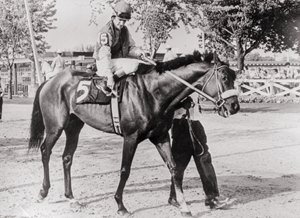BackTrack: Hawaii Wins United Nations at Atlantic City


If revenge is sweet, trainer MacKenzie Miller probably could not have dealt to Fort Marcy in winning the $125,000 United Nations Handicap.
Ever since the South African-bred colt was shipped in last year by Cragwood Stable owner Charles W. Engelhard for racing in the United States, Miller has been struggling to contain his praise.
"I'm not one to fall in love with horses," said Miller, "but the first time I laid eyes on *Hawaii, I fell in love with him. Nothing since then has caused me to change my opinion. He has beautiful conformation, tremendous determination, and a picture way of going."
In quarantine after arrival, *Hawaii spent 60 days confined in a stall, and Miller had to wait almost 13 months for his pride and admiration to be justified fully. He had derived a measure of satisfaction from two recent stakes victories (in the Stars and Stripes Handicap and a division of the Bernard Baruch), but was pained by *Hawaii's defeats by Fort Marcy in the Tidal and Kelly-Olympic Handicaps, thinking his colt in those two events on turf courses had been victimized by indecisive riders and poor racing luck.
With Manuel Ycaza tied up for the mount on Rokeby Stable's Fort Marcy, Miller decided to replace Braulio Baeza with Jorge Velasquez for *Hawaii in the U. N. Handicap. He decided also, when heavy rain a day or so ahead of the race left the course soft, to have the colt shod for the first time with jar caulks.
"I hadn't used jar caulks on him before because he is a natural grass horse and I didn't want to destroy his action or run the risk that he would hit himself," Miller said. "*Hawaii was the first horse I hadn't used them on. Assagai lived in them," he added, referring to Cragwood's runner which became the national grass-racing champion in 1966. Incidentally, he now says without hesitation: "*Hawaii is a better horse than Assagai."
*Hawaii, sent off at 17-10 odds, broke from the No. 9 post position in the field of milers. He was allowed to settle into stride alongside 2.30-1 Fort Marcy, which had departed two stalls closer to the hedge.
Rising Market and Addy Boy, the anticipated speed of the race, dueled for command going to the first turn, with Balustrade and North Flight tucked in right behind them. Fort Marcy and *Hawaii raced almost side by side in seventh and eighth places. Positions remained unchanged along the backstretch, but Ycaza and Velasquez were engaging in a tactical battle. Velasquez, having ridden Fort Marcy in the past, knew the Rokeby runner was not at his best while racing on the inside. Whenever Ycaza moved Fort Marcy a bit ahead, Velasquez would let out a notch to get back even or ahead of the top-weighted rival.
Their mounts at the end of the backstretch were within five lengths of the same four leaders, with Spire the only mare in the field, moving into contention at that point.
Midway around the turn, Rising Market and Addy Boy stopped abruptly, and Velasquez' strategy paid off. No room was left along the hedge for Spire, Balustrade, and Fort Marcy, but North Flight on the outside was left free and clear, rather suddenly he had a two-length lead with *Hawaii in hot pursuit while advancing rapidly from seventh to second.
As the new leaders dueled in the straightaway and opened daylight on the others, Fort Marcy still lacked racing room—for the third year in a row in the U. N. Handicap. He had been handled in the event the last two years by Velasquez, and in those outings, too, had been taken over the short route, for which he has distaste.
The 3-year-old North Flight fought on doggedly and led by 1 1/2 lengths passing the eighth pole, but Velasquez went to the whip and *Hawaii got in front for a half-length margin and a triumph worth $75,000. His time of 2:00 3/5, the slowest in the history of the handicap, attested to the soft condition of the turf.
Engelhard, on hand to enjoy the victory, said *Hawaii had been voted the champion yearling of his crop and also was the highest-priced yearling sold that year in South Africa.
The owner had taken the U. N. prize once previously, Assagai accounting for the 1966 running when he was a 3-year-old. That runner, too, at $24,000, had been a rather inexpensive yearling acquisition by the platinum magnate from Far Hills, N. J., who dabbles in $100,000 yearling purchases.
Fort Marcy had come into prominence at Saratoga in 1967 by pinning a defeat on Assagai in a division of the Bernard Baruch Handicap. That victory was mapped by Rokeby's trainer Elliott Burch, who instructed jockey Ron Turcotte to move on the outside of Assagai in the stretch because the latter would not give his best when racing on the inside. Miller doubtless thought that turn about was fair play in the U. N.
